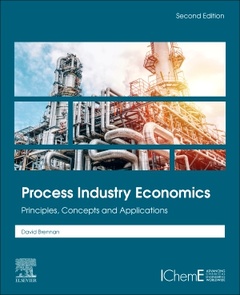Description
Process Industry Economics (2nd Ed.)
Principles, Concepts and Applications
Author: Brennan David
Language: English
Subject for Process Industry Economics:
Keywords
Capacity expansion; Capacity utilisation; Capital-dependent costs; Case studies; Cash flow; Competitive analysis; Consumptions; Cost estimation; Cost minimisation; Data sources; Environmental; Environmental projects; Estimating methods; Ethics; Expenditure proposals; Financing; Fixed and working capital; Forecasting; Government policy; Industrial ecology; Industrial organisations; Industry classification; Industry taxonomy; Inflation; Inside and outside battery limits; Intensification; Learning; Life cycle curves; Market volume; Personnel; Phased investment; Plant and equipment costs; Product classification; Products; Professional societies; Profitability; Profitability evaluation; Projects; Raw materials; Resources; Risk assessment; S curves; Safety; Safety projects; Scale economies; Selling price; Sensitivity analysis; Site location; Skill requirements; Sustainability; Taxation; Technology evolution; Unit costs; Utilities; Wealth generation
302 p. · 19x23.3 cm · Paperback
Description
/li>Contents
/li>Readership
/li>Biography
/li>Comment
/li>
Process Industry Economics: Principles, Concepts and Applications, Second Edition, explores the fundamentals of market evaluation, capital and operating cost estimation, and profitability evaluation, along with their implications for process technology evaluation, project development and investment decisions. Sections cover time dependent technology evolution in process plants, including scale development, performance improvement in new and operating plants, and learning related to environmental, safety and sustainability assessments. Influences on capital investment decisions, including capacity planning and environmental considerations are explored and supported by case studies. Finally, the aspects of overall industry performance and drivers are discussed.
1. The scope of process industry economics2. Market Evaluation and Forecasting3. Capital Cost Estimation4. Operating Cost Estimation5. Evaluation of Project Profitability6. Some Worked Examples in Process Economics7. Process Technology Evolution and Adoption8. Capital Investment Decisions9. Industry Planning and Structure
Advanced chemical engineering students as well as engineers and scientists working in the process industries. A useful resource for non-technical personnel working in the process industry and related businesses
- Outlines the basic principles of economic evaluation
- Identifies the roles of engineering, scientific, commercial and management personnel in contributing to economic evaluation
- Explores the interaction of economics with safety, environmental and sustainability criteria in project evaluation



